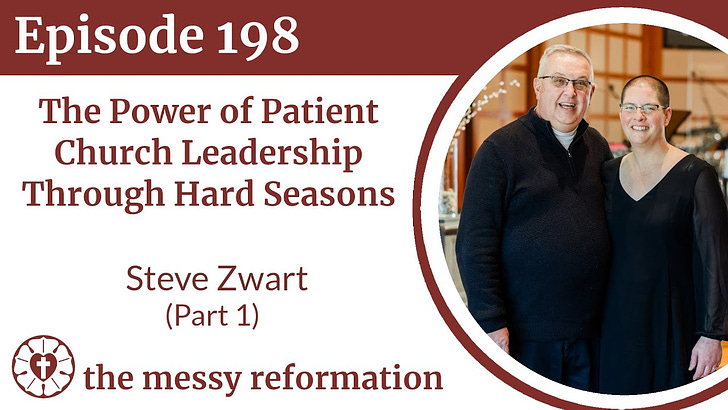Episode 198: The Power of Patient Church Leadership Through Hard Seasons - Steve Zwart (Part 1)
“Don’t bail just because it’s getting hard…Don’t bail just because there’s the smell of roast preacher in the air.” -Steve Zwart
Summary of This Episode
Welcome back to The Messy Reformation podcast! Jason and Willy are joined this week by Rev. Steve Zwart, pastor at First CRC in Sioux Falls, SD, where he started earlier this year after pastoring for 25 years at Unity CRC in Prinsburg, MN and a few years at a church plant in Maple Grove, MN. This part of the country is familiar territory for Steve, who grew up on a dairy farm in northwest Iowa, attended Hawarded CRC, and studied at Dordt University (then College) before heading to Michigan for seminary.
The three dive into his first charge for a little bit before Jason asks what he could carry over from such a short call to such a long call. While the setting and context were different, Steve points out the necessity of having “good, thoughtful conversations on the front-end, do some discerning, and yet just come in with a lot of grace!” He and Jason talk about how it takes time to build trust and bring about change. One of the things pastors do is listen and eventually help a congregation see their own “unhealth.” Steve expands by mentioning there’s often some anticipation and momentum with a new leader that can prod doing things fast, but having some conversations can aid in a more beneficial process. Part of slowing things down is creating buy-in: “bring people along in the story, have them…adapt or at least entertain the possibility of…change, and bring them along.”
Recognizing that things take time in churches, Willy invites Steve to share how he knew he would be in Prinsburg for the long haul. The short answer is starting around years 8 to 10 and then 12 to 13. It was toward the beginning of that time that he and Unity mutually agreed to take a three-month “timeout.” He attended a conference where Leith Anderson spoke, and heard about a common five-year cycle. In the first two years, you build trust. In the next two years, there’s some testing. If you get to year five, it’s a good time to implement–”peak-effectiveness.” But calls and relationships don’t just ride on year 5 until their end; they repeat. Steve felt this second cycle of years three and four testing with Unity, and he felt God calling him to press through. After year 10 there, he started noticing a change in the dynamic–not that it was always smooth sailing, the testing felt more positive than negative.
With that in mind, Steve encourages pastors, “Don’t bail just because it’s getting hard…Don’t bail just because there’s the smell of roast preacher in the air.” If you feel you’re at a point of considering another call–ask yourself if God is actually leading you to that or is it just hard? Jason points out the Bible never guarantees pastors or leaders of God’s people an easy call. He paraphrases Moses’ conversation with God when he “reminds” God that he didn’t birth them; they’re God’s people (Numbers 11:10-15).
Given that Jason, Willy, and Steve spent time in Classis Lake Superior, Willy asks what Steve enjoyed or learned during his time there. Steve notes that most if not all the churches in the classis went through 3-4 pastors during his time there; so, he saw and got to participate in a lot. He experienced a tough season of about five Article 17 separations in less than three years, which has an effect on other pastors. He really enjoyed the framing of classis meetings. Classis Lake Superior has a spring and a fall meeting and for each, the delegates arrive on Monday for a time of training or education, start their work, and then have a time of worship that evening. On Tuesday, they complete their business. The two-day structure allows ample free-time, which is good for fellowship and hanging out. Steve shares, “...It seemed like because of all that…once we got to business on Tuesday, things…went pretty smoothly because we had built trust, there was good community, and we were able to…work together. I’ve tried to tell people…we’d be more efficient if we did this overnight thing…Classis work would be…a bit healthier if there was that ‘bonus time.’” He recognizes this all takes intentionality but it helps the local church be healthier. Jason expands, “The healthier our classes can be, the healthier our denomination is going to be as well.” Next week, Jason brings us back to Synod 2023 where Steve served as a delegate.



